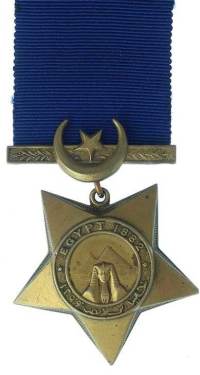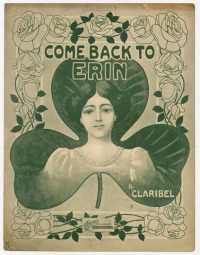-
 Soldier's Friend — a brand of cleaning paste (("for polishing the metal parts of a soldier's clothing and equipment" – Tommy's Pack Fillers))
Soldier's Friend — a brand of cleaning paste (("for polishing the metal parts of a soldier's clothing and equipment" – Tommy's Pack Fillers)) - spit and dribbles — military colloquialism for a fife and drum band. ((Cockerill, Sons of the Brave: the story of boy soldiers, 1984.))
- the press — cupboard (the usual term in Ireland). ((DHE.))
-

- Khedive's Star — awarded by the Khedive of Egypt to the British troops who installed him in power during the 1882 Anglo-Egyptian War. 2nd Royal Dublin Fusiliers, Mr Mack's battalion, only arrived in Egypt in 1885 – some time after the main fighting had finished. The Khedive's Star, however, continued to be issued until 1891. ((British Army Medals.))
- brummagem — cheap, showy trinket. (("counterfeit, sham, not genuine; of the nature of a cheap or showy imitation" – OED; from "local vulgar form" of "Birmingham".))
- sandstormers — ((sand-storm medal: "an Egyptian Army decoration" military – Partridge HS.))
- pass muster — (("come up to the required standard" orig. military: "to undergo muster or review without censure" – OED.))
- nothing pass remarkable — nothing out of the ordinary. ((passremarkable: "apt to be commented on" – DHE.))
- there's a war on ... from the catchphrase "don't you know there's a war on?" (("frequently employed with jocular irony, e.g. for 'hurry up!' or as a palliative, 'After all, there is a war on'" WW1, revived WW2 – Partridge, Dictionary of Catchphrases.))
- aetatis a nipper — misuse of Latin aetatis "of the age of" which expects a specific age to follow. ((nipper: a boy "especially if under 12" – Partridge.))
- barrack-rat — child born in barracks. ((Indian Army; non-officers' slang – Partridge HS.)) chuckaroo — (("a boy employed about a regiment" colloquial among soldiers in India – Partridge HS.))
-
 the Rock — Gibraltar. ((OED.))
the Rock — Gibraltar. ((OED.)) - power of — a great deal of. ((Slanguage.))
- wheresomever — wherever ((dialect – OED.))
- the cheese — (("anything first-rate or highly becoming" – Farmer 1904.))
- fair city — Dublin, elliptical. ((cf the ballad Molly Malone: "In Dublin's fair city ..."))
- the Colours — regimental flags <.
- battle honours — (("distinctions commemorative of battles which are placed, by order of government, on a regiment's colours" – Oxford Companion to Military History.)) Arcot, Condore ... — from the particular honours of the Royal Dublin Fusiliers.
- the Stilton — even better than "the cheese" (Stilton being "the king of cheeses").
- muffed — bungled. (("to miss (a catch or ball) at cricket or other games" colloquial and slang – OED.))
- quakebuttock — (("one wanting in courage" obsolete – OED.))
- pater — Latin, "father". (("familiarly used for father; chiefly in schoolboys' slang" – OED.))
- heaven be her bed tonight — pious expression with the effect of "may she rest in peace".
-
 mimosa — apparently Acacia caffra, family Mimosoideae. An Afrikaans name for this is "Wag'n Bietjie" which translates as "wait a bit" – from the habit of the thorns pulling one back. ((Trees of Southern Africa))
mimosa — apparently Acacia caffra, family Mimosoideae. An Afrikaans name for this is "Wag'n Bietjie" which translates as "wait a bit" – from the habit of the thorns pulling one back. ((Trees of Southern Africa)) - deo volenting — misuse of Latin deo volente, "God willing".
- fair dues — give him his due. ((fair do's: "fair and just treatment" A plural of 'do' as action (deeds), sometimes confused with 'dues' (requirements) without substantially altering the sense. UK, 1859. – Routledge Slang.))
- upped his age — pretended he was older than he was upon enlistment. (The lower age limit for enlistment at the time was 18 years. But the recruit had to be aged 19 to serve abroad. It seems likely it was the latter age that Gordie "upped" his to.) ((1914-18.net))
- thick — (("closely acquainted" – PWJ 1910.))
- the world and his wife — everybody. (("a very large number of people" – Cambridge Idioms.))
- first chop — first-rate, excellent. ((Anglo-Indian colloquial – Partridge HS.))
- noddle — (("the head as the seat of intelligence – or the lack of it" colloquial; often playful, often derisive – Partridge HS.))
- then the devil's not in Ireland — then nothing else, previously held as certain, is true. ex ((as sure as the devil's in Ireland: "very sure" – Partridge.))
- drapery miss — (("a girl of doubtful character, who dresses in a striking manner" – Ware 1909.))
- A credit to the nation ... — regimental song, save the Irish Times, May 1 1915, calls it a "street song". In the 1960s The Dubliners recorded an updated version. ♫♫ Irish Times report
- good-conduct badge — an error. Soldiers were not even eligible for a good-conduct badge (chevron on the lower sleeve) until after 2 years of service. ((Great War Forum)) skill-at-arms badge — badge worn on lower sleeve for proficiency in particular weaponry.
- Spectamur agendo — Latin, "We are judged by our deeds", regimental motto of the RDF.
-
 Come Back to Erin — sentimental ballad, often played at departures in Ireland, though it was in fact written by an English lady – "Claribel" (Charlotte Alington) in 1866. ♫♫
Come Back to Erin — sentimental ballad, often played at departures in Ireland, though it was in fact written by an English lady – "Claribel" (Charlotte Alington) in 1866. ♫♫ - has the dustman passed? — ((dustman: "personification of sleep or sleepiness; in allusion to the rubbing of the eyes as if there were dust in them" – OED.))
- club-books — the account books for the various savings clubs Mr Mack organizes. tally fortnights — his fortnightly collections. ((tally: "the record of an amount due; an account" – OED.)) but cf ((tallyman: "one who supplies goods on credit, to be paid for by instalments" – OED.))

| UK | US-h | US-p | |
|---|---|---|---|
| Pages | 79-86 | 76-81 | 67-72 |
| POV | Jim | ||
| Where | Macks' kitchen | ||
| When | Friday night, May 7 1915 | ||